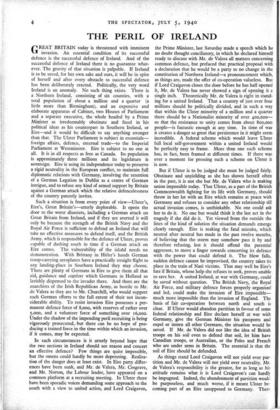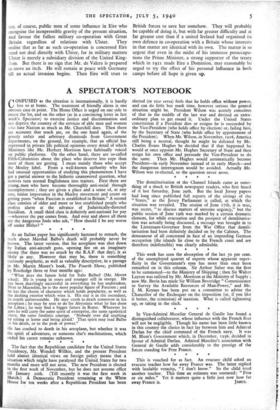THE PERIL OF IRELAND
GREAT BRITAIN today is threatened with imminent invasion. An essential condition of its successful defence is the successful defence of Ireland. And of the successful defence of Ireland there is no guarantee what- ever. The gravity of that situation is palpable. If Ireland is to be saved, for her own sake and ours, it will be in spite of herself and after every obstacle to successful defence has been deliberately erected. Politically, the very word Ireland is an anomaly. No such thing exists. There is a Northern Ireland, consisting of six counties, with a total population of about a million and a quarter (a little more than Birmingham), and an expensive and elaborate apparatus of Cabinet, two Houses of Parliament and a separate executive, the whole headed by a Prime Minister as irredeemably obstinate and fixed in his political ideas as his counterpart in Southern Ireland, or Eire—and it would be difficult to say anything stronger than that. The Ulster Parliament is subject in essentials— foreign affairs, defence, external trade—to the Imperial Parliament at Westminster. Eire is subject to no one at all. It is in all respects as free as Canada. Its population is approximately three millions and its legislature is sovereign. Eire is using its independence today to preserve a rigid neutrality in the European conflict, to maintain full diplomatic relations with Germany, involving the retention of a German Legation in Dublin as a centre of German intrigue, and to refuse any kind of armed support by Britain against a German attack which the relative defencelessness of the country patently invites.
Such a situation is from every point of view—Ulster's, Eire's, Great Britain's—utterly deplorable. It opens the door to the worst disasters, including a German attack on Great Britain from Ireland, and if they are averted it will only be because the strength of the British Navy and the Royal Air Force is sufficient to defend an Ireland that will take no effective measures to defend itself, and the British Army, which is responsible for the defence of Ulster, proves capable of dashing south in time if a German attack on Eire comes. The vulnerability of the islaEld needs no demonstration. With Brittany in Hitler's hands German troop-carrying aeroplanes have a practically straight flight to any landing-place in Southern Ireland they may choose. There are plenty of Germans in Eire to give them all that aid, guidance and comfort which Germans in Holland so lavishly dispensed to the invader there. And there are the anarchists of the Irish Republican Army, as hostile to Mr. de Valera as they are to Mr. Churchill, who would support such German efforts to the full extent of their not incon- siderable ability. To resist invasion Eire possesses a per- manent defence force of 8,000, with reserves of rather over 5,000, and a volunteer force of something over 16,000. Under the shadow of the impending peril recruiting is being vigorously prosecuted,. but there can be no hope of pro- ducing a trained force in the time within which an invasion, if it comes, may be expected.
In such circumstances is it utterly beyond hope that the two sections in Ireland should see reason and concert an effective defence? Few things are quite impossible, but the omens could hardly be more depressing. Realisa- tion of the danger does at least exist. In Eire party differ- ences have been sunk, and Mr. de Valera, Mr. Cosgrave, and Mr. Norton, the Labour leader, have appeared on a common platform at a recruiting meeting. In Ulster there have been sporadic voices demanding some approach to the south with a view to united action, and Lord Craigavon, the Prime Minister, last Saturday made a speech which he no doubt thought conciliatory, in which he declared himself ready to discuss with Mr. de Valera all matters concerning common defence, but prefaced that practical proposal with a declaration that he would be a party to no change in the constitution of Northern Ireland—a pronouncement which, as things are, made the offer of co-operation valueless. But if Lord Craigavon closes the door before he has half opened it, Mr. de Valera has never showed a sign of opening it a single inch. Theoretically Mr. de Valera is right in stand- ing for a united Ireland. That a country of just over four millions should be politically divided, and in such a way that within the Ulster minority of a million and a quarter there should be a Nationalist minority of over 400,000— so that the resistance to unity comes from about 800,000 people—is fantastic enough at any time. In time of war it creates a danger so great that persistence in it might seem incredible. A federal scheme which would leave Ulster full local self-government within a united Ireland would be perfectly easy to frame. More than one such scheme has, in fact, been framed at different times. If there was ever a moment for pressing such a scheme on Ulster it is now.
But if Ulster is to be judged she must be judged fairly. Obstinate and unyielding as she has shown herself often in the past, it is not she but Mr. de Valera who is making union impossible today. That Ulster, as a part of the British Commonwealth fighting for its life with Germany, should throw in her lot with an Eire which remains at peace with Germany and refuses to consider any other relationship till actual invasion comes, is unthinkable. No one could ask her to do it. No one but would think it the last act in the tragedy if she did do it. Yet viewed from the outside the lines of the kind of solution the situation demands emerge clearly enough. Eire is making the fatal mistake, which neutral after neutral has made in the past twelve months, of believing that the storm may somehow pass it by and therefore refusing, lest it should offend the potential aggressor, to move a finger towards concerting its defence with the power that could defend it. The blow falls, sudden defence cannot be improvised, the country takes its place in the train of Nazi victims. That may well be Eire's fate if Britain, whose help she refuses to seek, proves unable to save her. A united Ireland, at war with Germany, could be saved without question. The British Navy, the Royal Air Force, and military defence forces properly organised and led, could make the invasion of Eire impossible— much more impossible than the invasion of England. The basis of fair co-operation between north and south is clear. If Ulster would abandon partition in favour of some federal relationship and Eire declare herself at war with Germany, give the German Minister his passports and expel or intern all other Germans, the situation would be saved. If Mr. de Valera did not like the idea of British troops on his soil even to defend that soil, let him have Canadian troops, or Australian, or the Poles and French who are under arms in Britain. The essential is that the soil of Eire should be defended.
As things stand Lord Craigavon will not yield over par- tition and Mr. de Valera will not yield over neutrality. Mr. de Valera's responsibility is the greater, for as long as his attitude remains what it is Lord Craigavon's can hardly be impugned. Indeed, the abandonment of partition woule be purposeless, and much worse, if it meant Ulster be- coming part of an Eire unopposed to Germany. There are, of course, public men of some influence in Eire who recognise the inexpressible gravity of the present situation, and favour the fullest military co-operation with Great Britain regardless of relations with Ulster. They realise that as far as such co-operation is concerned Eire need not deal directly with Ulster, for in military matters Ulster is merely a subsidiary division of the United King- dam. But there is no sign that Mr. de Valera is prepared to move an inch. He will remain at peace with Germany till an actual invasion begins. Then Eire will trust to British forces to save her somehow. They will probably be capable of doing it, but with far greater difficulty and at far greater cost than if a united Ireland had organised its own defence in co-operation with a Britain whose interests in that matter are identical with its own. The matter is so urgent that even in the midst of his immense preoccupa- tions the Prime Minister, a strong supporter of the treaty which in 1921 made Eire a Dominion, may reasonably be urged to try the effect of his personal influence in both camps before all hope is given up.































 Previous page
Previous page